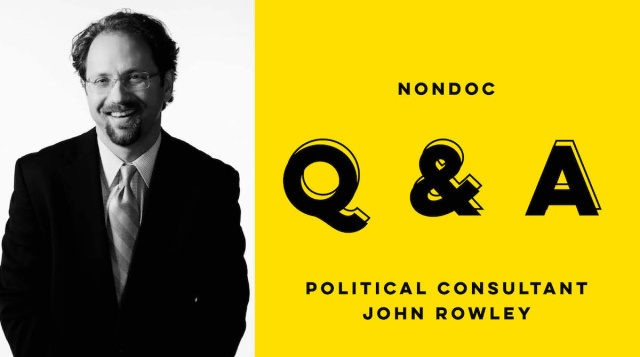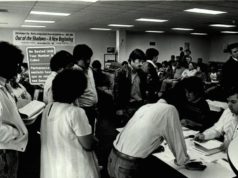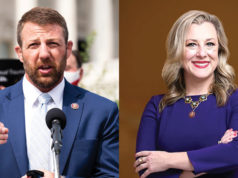Pop quiz: Let’s say Michael Bloomberg enters the 2016 presidential race as an independent. What happens?
In a rare moment of modesty, one political consultant admits he has no idea.
John Rowley is a partner at Fletcher Rowley, a Democratic political-media consulting firm in Nashville, Tenn. His firm has represented a variety of political candidates, businesses and nonprofits, and they just wrapped up work helping elect a Democrat governor of Louisiana. They are also involved in the Baltimore mayoral race, among others.
NonDoc publisher Andrew Rice recently had the chance to pick Rowley’s politics-obsessed brain about presidential candidates from both parties, as well as the ins and outs of the Donald Trump phenomenon. The following Q&A took place via email. Responses have been lightly edited for style.
Which GOP candidate do you think is running the best campaign?
Ted Cruz, hands down. His essential campaign began in 2011 when he entered the Senate. He has made progress month by month and year by year. His campaign almost kicked off with national ads he ran during a Senate battle on sequestration where he raised money and built his national profile in about 2013. He seems to be going by his own playbook, and it is working, and he’s making steady progress. Rubio and Trump have run amazing campaigns in their own way. One of the stories is how many good campaigns and how few implosions there have been on both sides. In a month, my answer will probably change to Rubio if he keeps his momentum going.
Which Democrat is running the best campaign, and is it similar to any of the Republicans’?
Both Democrats are running good campaigns. Sanders is very surprising. I’m not sure Bernie can even fully explain what is going on with his appeal. The Iowa primary was fascinating because Trump needed to expand the caucus makeup to win, and he didn’t. Sanders needed more new caucus-goers, and he did that, and there was a big turnout, but he still came up a little short. Also, all the talk about a “ground game” was overhyped.
Every campaign needs field, paid media, online campaigning, good news media coverage and more. Commentators wildly overvalued the spin coming from campaigns about the “ground game.” Cruz had it and won. Rubio really didn’t and was the biggest winner of the night.
What’s the lesson? There is never just one thing that a race or a surprise finish comes down to in the final analysis.
Who is the big winner coming out of Iowa?
Rubio and Cruz for sure, and maybe Trump as well. I’ll be surprised if, in a month, Bush, Christie and Kasich are not out (or have “suspended” their campaigns) and Rubio is gathering their supporters. But, whoever comes in second or third in New Hampshire could get some big life. If it is Rubio, he will have major momentum. Rubio will attract more support and grow legs because he exceeded expectations. Cruz was a winner because a win is a win, especially when polls said he would lose. For Trump, the loss could be the wake-up call he needs to make some changes and do some of the best practices of winning campaigns. Some of the laws of presidential campaign physics do not apply to Donald Trump, but most of them still do.
Were there any missteps by Donald Trump before or after Iowa?
Trump broke the golden rule of politics by unnecessarily raising expectations. There is no upside to repeatedly saying, “I’m going to win big.” I disagree with those who speculate that skipping a debate and doing the veterans’ event was a mistake. He probably failed to run a systematic, scientific campaign of reaching out to voters with TV ads, targeting, direct mail, online campaigning, door knocking, phone calls and retail politics. You can’t win Iowa mainly through the national media alone. But he did prove he could come in second, and no one would have believed that in June 2015. All the more reason he should have lowered expectations going into election day!
Anything surprise you about the Bernie Sanders campaign?
Everything has been surprising: his fundraising, his early big crowds, his grassroots support and his performance in Iowa. It proves if you have a great message you can take off, even if you are not the perfect messenger, like Obama was in 2007 to 2008.
Can Donald Trump ride his media stardom to the nomination, or does he need to assemble a traditional campaign?
He is a master of orchestrating national media attention. He now needs to run a real political campaign. It’s probably too late to put that kind of operation together if he hasn’t already built it. The question is, does he have the people and plan to do this? Trump may be like a sports team with a great offense and no defense. He does very well for a while but, when the competition heats up, he loses when you think he should win.
Are any of the GOP candidates in a good position to vie for VP consideration?
Kasich, Bush, Carly or Christie are toast without a surprising second- or third-place finish in New Hampshire. The GOP really needs a balanced ticket: A) one nonwhite guy; B) a governor; and C) candidates from swing states. That said, it’s also hard to see Bush or Christie playing second banana, especially since they were both frontrunners before they committed political hari-kari. Kasich would be a solid pick for any of them except Trump. Trump would need to look to Cruz, Rubio, Carly or someone else. Democrats fantasize about Trump-Palin. If that happens, White House drapes will be measured at record speeds.
What would Michael Bloomberg entering the race as an independent do to the dynamics? Does it hurt or help Hillary Clinton if she is the nominee?
It would make the most fascinating primary season into a fascinating general election as well. Recent research has shown an independent hurts Republicans a little more, including some research about Bloomberg running in 2012. Republicans would argue Bloomberg’s gun advocacy hurts Democrats more. I’ll do what political consultants (not to mention talking heads) never do publicly: I’ll admit I don’t know. Frankly, what research says today may change based on who the Republicans nominate. I do know one thing: It will be interesting to watch if it happens.
Which dead president or former politician would you most like to have dinner with, and why?
Why limit it? I’d take a roundtable of FDR, Thurgood Marshall, Margaret Thatcher, LBJ, JFK, Lincoln, Reagan, Teddy Roosevelt and Nelson Mandela. I’d like to get their wisdom and also ask them some tough questions about their mistakes.
(Editor’s Note: John Rowley has authored a commentary for NonDoc in the past. Read it here.)






















